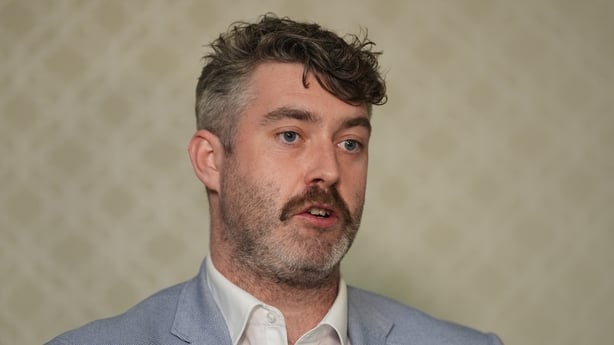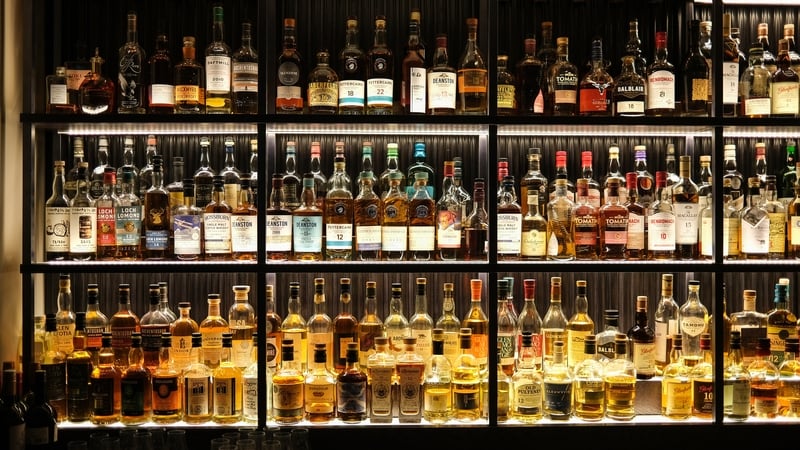The threat of US tariffs is “very concerning” for Ireland’s spirits sector, the director of Irish Whiskey Association (IWA) has said.
US President Donald Trump said the US would place a 200% tariff on wine, champagne and other alcoholic products from France and other EU countries in retaliation against the EU’s planned levies on US-produced whiskey.
It is the latest move by the US President in a trade war he launched against competitors and partners alike since taking office.
Yesterday, the European Union unveiled tariffs countering US moves on steel and aluminum, hitting some €26bn ($28bn) of US goods in stages from April.
President Trump renewed his criticism of the bloc, singling out a 50% levy on US whiskey as being “nasty”.
Irish whiskey could be among the products hit with the 200% tariff.
IWA Director Eoin Ó Catháin said that are “no winners” when tariffs get involved and that the Distilled Spirits Council of the US was also opposed to them.

Mr Ó Catháin told reporters in Washington DC: “We’ve enjoyed reciprocal zero-for-zero trade since 1997. It’s been tariff free for Ireland, the EU and the US, and we’ve had immense success since then.
“So what we want to make sure now is that we don’t change that. There’s been announcements made, but there’s no tariff implemented. And that does give us limited space. It’s a window of opportunity for a dialogue to start.”
He added: “We’ll have the support from from the Irish government to start those discussions, but we work to do to make sure that it doesn’t get to that.”
Irish Whiskey exports to the US are worth just over $1bn. Ireland is now the fourth biggest export market for Kentucky bourbon whisky, according to the IWA.
Mr O Cathain said the tariffs could have an impact on consumers and added: “We want to make sure that every consumer can enjoy the spirits that they want – and I think it might be needed after this week.”
Martin calls for dialogue after tariffs threat from US
The Taoiseach has said dialogue between the US administration and the European Commission is the only way that the trade tensions would be resolved.
Speaking in Washington, Micheál Martin said there will be discussions at the European Council later this month and further discussions with the European commission on EU actions on tariffs responding to the US moves.
“Obviously we’ve been endeavoring to protect Irish interests in terms of specific Irish products and Irish sectors”, he said.
We need your consent to load this comcast-player contentWe use comcast-player to manage extra content that can set cookies on your device and collect data about your activity. Please review their details and accept them to load the content.Manage Preferences
Asked if the problem was the Commission’s use of a 2017 move to tariff US bourbon whiskey exports as an immediate riposte to the US steel and aluminium tariffs announced by President Trump, Mr Martin said
He said: “We need to refine some of this, because that was an old playbook in a different set of circumstances, with perhaps different agendas.
“And I think this is a new situation, and therefore I think there has to be a strategic approach to the areas that there will be reciprocal tariffs on, but that will be part that Europe has announced a menu.
“There will be consultation on that menu in the time ahead within Europe.”
The Taoiseach also said “We now have the next number of weeks to actually engage with the EU Commission in respect of that issue, and we’ll be making those points.
“And I think this is somewhat similar to what happened before, but our view is that there needs to be more strategic position. And we’ll see how it unfolds.”
Uncertainty around alcohol tariffs will create ‘difficulties for business’ – Taoiseach
Mr Martin also warned that uncertainty around alcohol tariffs will create “difficulties for business”.
He said there is a need for Europe to improve its own competitiveness through “simplification of regulation”.
He said: “One would hope that this would settle in time, but the uncertainty does create difficulties for business, does create difficulties for investment decisions, and that certainly is challenging.
“Businesses will have to adapt as this evolves, and Government will work with business. We have mechanisms now to engage with business, both domestically and here (in the US), on these issues and how they unfold.”




